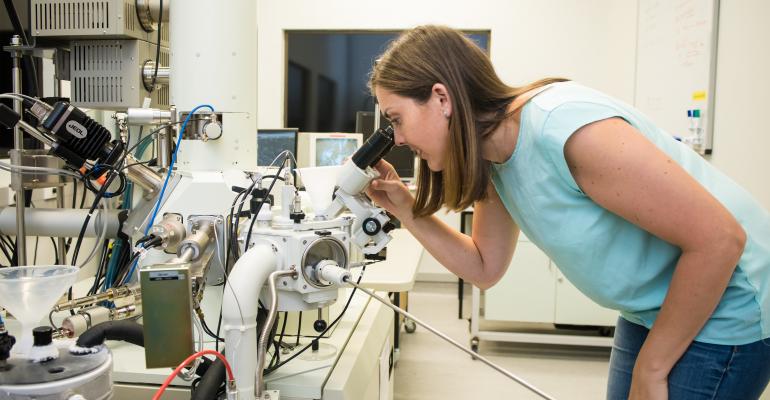
Dr Renee Goreham
Renee is one of our SfTI researchers. She grew up in rural Australia and moved to New Zealand in 2016 with her husband Rich, and her children Ella (6) and Evan (3).
What attracted you to a career in science?
I went to high school in Port Augusta, South Australia. I would say that my science teacher definitely influenced my career direction. I moved to Adelaide and started my undergraduate study in 2004. I graduated with a Bachelor of Science with honours in 2008 from Flinders University.
I started my PhD in 2009 at the University of South Australia, where I made density gradients of nanoparticles to observe how small surface changes (at a nanoscale) influenced mammalian cell growth. I wrote my thesis whilst on maternity leave in 2013, graduating in March 2014. I had a post-doctoral position at Flinders University until I started a position with Prof Thomas Nann at the end of 2014 and I went on maternity leave in 2015.
In 2016, I started a post-doctoral fellow position at Victoria University of Wellington and in 2018, I accepted a lecturing position. My research group synthesises and characterised nanomaterials but we also have an interest for scrutinising natures's own nanomaterials, named extracellular vesicles.
I find my research in nanotechnology "my drug of choice", finding new concepts or materials is very exciting for me.
What's your role with SfTI?
I am a primary investigator for a seed project which looks at development of new magnetic resonance imaging contrast agents that are less toxic. I started this project in 2016, and it is set to finish in 2019.
What do you find exciting about SfTI?
The fact that SfTI is open to applications that at risky and innovative is appealing. Blue sky research is where high impact and revolutionising ideas comes from. Also, the grant applications are open to emerging researchers (like me) with mentors that travel with you throughout your project.
If you could give a mark out of ten to New Zealand science, what number would you choose, and why?
9/10. New Zealand has a small but accessible research community. The fact that we can travel anywhere in New Zealand within a couple of hours opens collaborative partnerships with all Universities. The major hurdle is for start-up companies but there is a big push to change this and I believe we will see the benefits soon.
In your view, what is the role of Vision Mātauranga in SfTI?
To me it's about integrating knowledge from scientists, funders and research users and the Māori community. It is not only important to invest in our researchers but from the knowledge from the local indigenous people.
What have you learnt from being part of SfTI that you may not have learnt otherwise?
Thinking about the future of your project can really help develop it. It has been suggested throughout my SfTI journey that engaging with end-users at the early stages can be very helpful. Most funding agencies have a more hands-off approach, but I really appreciate the mentor approach and the research development opportunities that are provided by SfTI.
How has SfTI added value to you as a researcher and to your research?
As mentioned, SfTI have many opportunities to go to research and professional development workshops throughout each year. This has really helped me to grow as an emerging researcher and a leader in my field. At this stage in my career, I have found the leadership and development workshop instrumental to be growth of my research community.